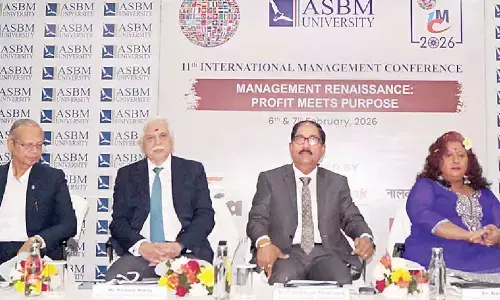Institutional arbitration remains a non-starter

Many are unaware that the arbitrators’ award is binding. Certain government officials and bankers are ignorant that an arbitration award by a party-appointed arbitrator is equivalent to a court decree. There are numerous instances of these officers mocking the institutional arbitrators' awards. Section 11(3A) of the Act seeks that the High Courts and Supreme Court designate arbitration institutions, which is still a non-starter. There is an urgent need for the Centre and all the High Courts in the country to take note of the institutions operating in each state and designate them as arbitration institutions in order to alleviate the much-discussed burden on courts
Despite much publicity given to the institutionalisation of arbitration, an alternative dispute resolution (ADR) mechanism in India, it is still a non-starter. With the amendment of the Arbitration and Conciliation Act, 1996 in 2019, and 2022, the Government of India ushered in a new era in the arbitration system in India which is hitherto limited to courts and individual choices.
Historically, communities and family elders have resolved disputes within the families and the communities. Formal judicial systems, the courts of today, evolved over time alongside the development of democracies and other widely accepted forms of government. As the rights-based approach to justice delivery gains prominence on a global scale, access to justice is suffocated by bureaucratic processes. The increasing burden of over 4.9 crore pending cases in Indian courts prompted policymakers to consider strengthening alternative dispute resolution (ADR) mechanisms.
With the passage of the Arbitration Act in 1940, pre-independent India recognised arbitration as one of its ADR mechanisms. With the enactment of the Arbitration and Conciliation Act of 1996 (The Act for short), Indian Arbitration law radically altered its scope. However, it was not free from judicial interventions and interference. Courts utilised arbitration to shift some of their burden to arbitrators they appointed. Even today, the common belief is that arbitrators are appointed by courts, but, in fact, it is not so.
The recommendations of the Justice B N Srikrishna Committee of 2017 appointed by the government to look into the institutionalisation of arbitration have led to the amendment of the Act in 2019 and institutionalisation of arbitration has been given a priority. AMIKA Arbitration and Mediation Council, Hyderabad, Indian International Arbitration Centre, New Delhi, Indian Council of Arbitration New Delhi, Indian Institution of Arbitration, Kerala, and Nani Palkhivala Arbitration Centre, Chennai, are some of the arbitration institutions in India that are engaged in institutional arbitration with greater force acquired since the amendment of the Act in 2019. These institutes have their own rules, regulations, and procedures based on the Act and United Nations Commission on International Trade Law-recommended guidelines (UNCITRAL).
The only requirement for these institutions to take up a dispute for arbitration is the existence of an arbitration clause in the contracts between the disputants or their mutual agreement for arbitration. Arbitrations are conducted in accordance with the institution's rules and are supervised by the institution, which is responsible for various aspects relating to arbitral tribunal composition, administrative, financial, legal matters and ensuring the quality of an award passed by their panel arbitrator. An arbitration award thus made is based on evidences and arguments, similar to a judge, but without lengthy procedures, extended dates, or extensive arguments.
Institutional arbitration is an opportunity for the disputing parties for they are saved of time, money and relationships. Property disputes, financial disputes, partnership disputes, franchisee disputes, construction disputes, and any other commercial or business disputes may be arbitrated if a contract specifies arbitration as a dispute resolution mechanism. Even if no arbitration agreement exists, parties can initiate arbitration by submitting a mutually signed letter to an arbitration institution requesting appointment of an arbitrator. The institution handles the remaining tasks like a court. The arbitration institutions maintain absolute secrecy throughout the entirety of the procedure. Small and medium-sized enterprises, construction industry, civil contractors, families seeking property division among siblings, and others with arbitrable cases can walk into the offices of the arbitration institutions and file their cases for arbitration without the assistance of lawyers or advocates, as opposed to a litigation. The parties dissatisfied with an arbitrator's award may petition a court under the Section 34 of the Act within 90 days to set aside the award.
Institutional arbitration is not free from challenges. People continue to be unaware that court intervention is not required for the appointment of an arbitrator. Likewise, many are unaware that the arbitrators' award is binding. Certain government officials and bankers are ignorant that an arbitration award by a party-appointed arbitrator is equivalent to a court decree. There are numerous instances of these officers mocking the institutional arbitrators' awards. Section 11(3A) of the Act seeks that the High Courts and Supreme Court designate arbitration institutions, which is still a non-starter. Four years after the passage of the law, the promised Arbitration Council of India to authorise and regulate Arbitration Institutions has yet to be operationalised. Except for a small number of arbitration institutions established and funded by well-known law firms, some state governments do not support other professionally established arbitration institutions. Thus, there is an urgent need for the Centre and all the High Courts in the country to take note of the institutions operating in each state and designate them as arbitration institutions in order to alleviate the much-discussed burden on courts.
(Writer is Former Senior Advisor, United Nations Development Programme)











